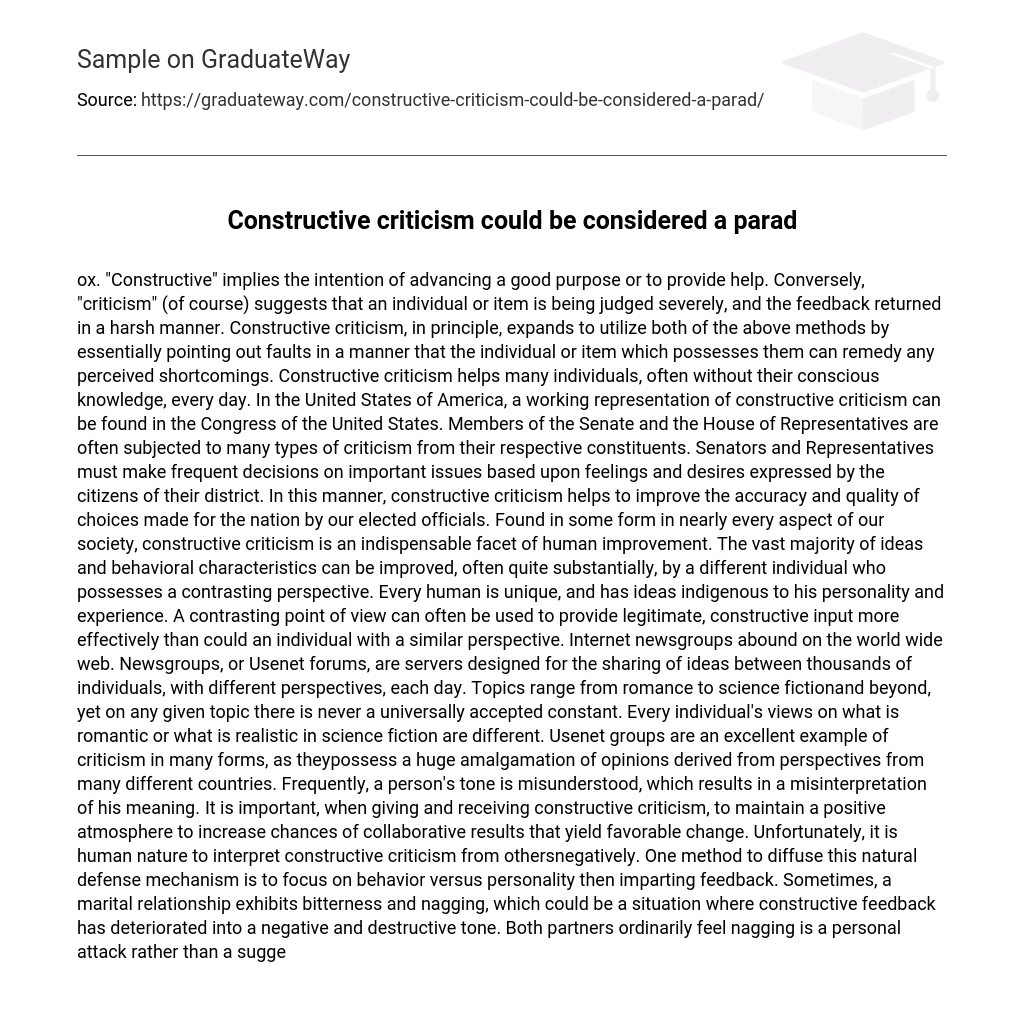ox. “Constructive” implies the intention of advancing a good purpose or to provide help.
Conversely, “criticism” (of course) suggests that an individual or item is being judged severely, and the feedback returned in a harsh manner. Constructive criticism, in principle, expands to utilize both of the above methods by essentially pointing out faults in a manner that the individual or item which possesses them can remedy any perceived shortcomings. Constructive criticism helps many individuals, often without their conscious knowledge, every day. In the United States of America, a working representation of constructive criticism can be found in the Congress of the United States.
Members of the Senate and the House of Representatives are often subjected to many types of criticism from their respective constituents. Senators and Representatives must make frequent decisions on important issues based upon feelings and desires expressed by the citizens of their district. In this manner, constructive criticism helps to improve the accuracy and quality of choices made for the nation by our elected officials. Found in some form in nearly every aspect of our society, constructive criticism is an indispensable facet of human improvement. The vast majority of ideas and behavioral characteristics can be improved, often quite substantially, by a different individual who possesses a contrasting perspective.
Every human is unique, and has ideas indigenous to his personality and experience. A contrasting point of view can often be used to provide legitimate, constructive input more effectively than could an individual with a similar perspective. Internet newsgroups abound on the world wide web. Newsgroups, or Usenet forums, are servers designed for the sharing of ideas between thousands of individuals, with different perspectives, each day.
Topics range from romance to science fictionand beyond, yet on any given topic there is never a universally accepted constant. Every individual’s views on what is romantic or what is realistic in science fiction are different. Usenet groups are an excellent example of criticism in many forms, as theypossess a huge amalgamation of opinions derived from perspectives from many different countries. Frequently, a person’s tone is misunderstood, which results in a misinterpretation of his meaning.
It is important, when giving and receiving constructive criticism, to maintain a positive atmosphere to increase chances of collaborative results that yield favorable change. Unfortunately, it is human nature to interpret constructive criticism from othersnegatively. One method to diffuse this natural defense mechanism is to focus on behavior versus personality then imparting feedback. Sometimes, a marital relationship exhibits bitterness and nagging, which could be a situation where constructive feedback has deteriorated into a negative and destructive tone. Both partners ordinarily feel nagging is a personal attack rather than a suggestion for a needed personal change, such as the placing of the cap on the toothpaste tube when one is through using it.
Commonly, constructive criticism is misinterpreted as a personal attack toward the individual being criticized. Obviously, it is detrimental, rather than helpful, to imply that an individual is incapable or useless instead of presenting one or many options anindividual has for his improvement. An individual who wishes to administer constructive criticism to another must be cautious not to do so in a way that would project an incorrect meaning behind the criticism. Recently, I observed a math teacher informing astudent that he had failed a test because of poor workmanship on a certain concept. It is my belief that the teacher simply wanted to provide constructive criticism to the student, suggesting that he practice the concept again.
The student, however,took the remark the wrong way, insulting the teacher as he left the room. It is more likely that the student would have proceeded to practice his math concepts had the teacher used a more subtle approach. Constructive criticism is everywhere. The previous example, which analyzed an individual’s actions, was basically constructive criticism in itself. Making a conscious decision to positively acknowledge and utilize constructive criticism for our benefit as a individual will unquestionably further today’s current society as a whole.
Humans have the capability to improve themselves and the lives ofothers. Individuals adept at soliciting, giving, and receiving constructive criticism are far more likely to improve their own faults. These improvements are visible in many aspects of society, including the ability to deal with a diverse selection of individuals,manage behavior in groups, and the understanding of basic psychological principles of human behavior and interaction. Individuals who possess some or all of these characteristics are the future of our society.
As such, constructive criticism is oneof the most exigent and indispensable core elements of the human race.





